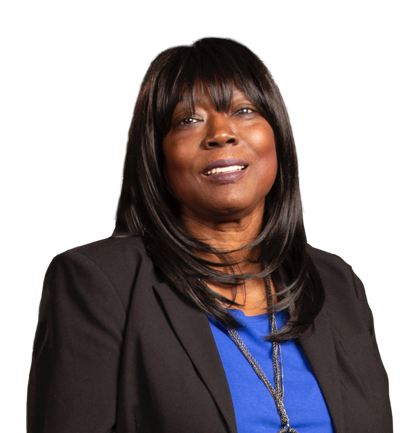Working with Takeda to Educate Others about Gastrointestinal Disorders
Ten years ago, I would have introduced myself as Gwen. Today, I am Gwendolyn, a version of me that’s been to hell and back with Short Bowel Syndrome, or SBS. A me who’s come to know a strength she had no idea she possessed. Gwen, before SBS, was career-driven, rushing through life. Everything for me was fast-paced—work, home, and family. But that was ten years ago, before SBS barged in and reshaped my entire life, stripping me of my identity. With August being SBS Awareness Month, I am sharing my story about living with SBS and an ostomy, as a way to drive awareness of this disease among others like me who are impacted.
 I’m your typical New Yorker. What comes up, comes out. But not when it comes to SBS. It’s not the prettiest of conditions, is it? Intimate details aside, no one really understands what we’re going through. When I was diagnosed, I felt so isolated. To this day, I still have flashbacks of being in that hospital bed, wondering why. I wasn’t comfortable discussing what I was going through. No one deserves to feel alone with SBS. We are not hopeless. I don’t believe that. I’d like to believe that what I’ve been through is for a reason. Maybe sharing my story is my reason—to help people see that SBS can be a beginning, and not an end.
I’m your typical New Yorker. What comes up, comes out. But not when it comes to SBS. It’s not the prettiest of conditions, is it? Intimate details aside, no one really understands what we’re going through. When I was diagnosed, I felt so isolated. To this day, I still have flashbacks of being in that hospital bed, wondering why. I wasn’t comfortable discussing what I was going through. No one deserves to feel alone with SBS. We are not hopeless. I don’t believe that. I’d like to believe that what I’ve been through is for a reason. Maybe sharing my story is my reason—to help people see that SBS can be a beginning, and not an end.
I entered the workforce shortly after completing high school. In 1991, I began working in construction. The minute I walked onto a job site, I felt at home. I started out as a temporary receptionist and after various projects, I worked my way up to office manager. I worked in construction for over 20 years. Come 2009, I was the administrative manager for the largest construction project in the country. I was happily married, living in the Atlanta suburbs, and enjoying any time I got to spend with my precious granddaughter. Life was good. I really felt like I had arrived. In fact, I was so focused on my job and being everything to everybody that I wasn’t giving the pain I’d been experiencing the attention it deserved.
By then, I’d undergone three separate abdominal surgeries: one to remove my appendix at age four, another to address a small bowel fistula at age 27, and finally a hysterectomy at age 40. For years, I’d been experiencing intense abdominal pain, which I’d alleviate with a pain reliever here and a pain reliever there. Until, one day, the pain relievers stopped doing the trick, and I’d just about had enough. I decided to finally seek medical attention. Turns out, I had quite a bit of scar tissue and adhesions leftover from my past surgeries. After talking it over with my doctors, I decided to go ahead with surgery to clean it up.
As far as I knew, the surgery was a success. I was released from the hospital on my 54th birthday. Two weeks later, my daughter came over and found me, incoherent, with a greenish fluid seeping through my surgical dressing; my temperature had spiked to 104 degrees. I was rushed to the hospital and immediately sent into surgery. I had developed a bad sepsis infection as a result of multiple fistulas found within my small bowels. I underwent two additional surgeries, which required the removal of portions of my small bowel, and was placed in a medical coma. While in the coma, my husband made the decision to have an air ambulance fly me to a larger facility where I was immediately rushed into surgery—again. This surgery would end up costing me additional portions of my small bowel and my colon as well.
I remember waking up days later and having no idea what had happened. So where am I? At a different facility, and in critical condition, so bad that they’d previously advised my daughter to say her goodbyes. My abdomen was completely opened and connected to wall suction. I also was left with an ileostomy. I’d have to now receive nutrition via total parenteral nutrition (TPN) twenty-four hours a day, seven days a week. At no point did anyone say a thing about SBS.
I was admitted in May of 2009. I ended up going home in April of 2010. My body couldn’t seem to hold off the ongoing infections. It seemed that everything that could possibly go wrong did. Let me tell you, I cried a lot. I couldn’t help but think, Why me? What had I done to deserve this?
My husband came to visit every day after work and stayed with me in the hospital on the weekends. One day he came in and I was having one of my uncontrollable crying spells. He lost his temper. He said to me, “What the hell are you doing? You are not doing anything to help yourself!” He spoke the truth; no sugarcoating it. I got angry. But you know what? I needed to get angry. I needed to feel something other than self-pity. I stayed angry for a long time after that day—not at him, not at the doctors, but at myself for not doing my due diligence. It was hard for me to admit that. As an administrator, I was used to surveying contracts, invoices, as well as familiarizing myself with the details. Yet when it came to my health and being my own advocate, I felt I had failed. But that didn’t mean I couldn’t start now. My husband helped me see that. He got me out of bed every single day to walk. He would wrap me up in blankets, place me in a wheelchair, and take me outside in the dead of winter in order for the sun to hit my face.
I managed to make it back to see my original gastroenterologist in April 2010 after I was discharged from the acute care facility, who for the first time diagnosed me with Short Bowel Syndrome (SBS), or what he called “short gut.” After my diagnosis with SBS, it took me a long time to come to terms with it; no one told me how different my life could be. I had no choice but to do a little soul searching, and it was there I met Gwendolyn. Gwendolyn wasn’t scared; she wanted some answers. Gwendolyn knew that, in terms of healthcare, there had to be more options out there.
After I was discharged, I returned to the hospital in May of 2010 in order to reverse the ileostomy and close the opening in my abdomen. I prayed that, afterwards, things would go back to normal. Boy, was I wrong. I had lost 75 percent of my small bowel and 25 percent of my colon.
I was tired of relying on TPN. By that point my doctor and I reduced the amount of time for my infusion requirements at home. There were nights I couldn’t bring myself to connect to TPN, and my husband had to do it. I got tired of wearing the backpack if I went out, and people asking, “Are you going camping?”
My infectious disease doctor recommended a gastroenterologist he thought would be a good fit. He was right. At my first appointment with her, she listened to my case and evaluated treatment options that would help me reach my treatment goals.
To help monitor my health and stay where I want to be medically, I keep a daily log, which includes voids, bowel movements, when I take my medication, daily activities, and what foods I’ve eaten. I even log my blood pressure and temperature. I see my gastroenterologist every two months. A log takes the burden of remembering off my shoulders, and all of my doctors seem to appreciate the effort. I have an amazing medical team. My gastroenterologist. My infectious disease doctor. My therapist. My nephrologist. And my primary care physician. But my surgeon, he was a gift. The last time I saw him was in April of 2017. I had been his patient for eight years. Before I left his office, he gave me some of the best advice to date; he said, “It’s time to go ahead and live your life.” I can hardly talk about that man without crying. He saved my life, in more ways than one.
The reality is, I have good days and bad days. On my good days, I spend that time making cupcakes for my granddaughter. I make a mean cupcake. I do laundry. I go out with friends. That’s right—I leave my house! I don’t go anywhere without my little toolkit. Inside my purse, I’ve got baby wipes, disinfectant spray, odor eliminator, rubber gloves, and hand sanitizer. But you know what? It works for me.
While I don’t miss some of the old Gwen, I do miss her tenacity. So I’m working on getting a little of the old me back—saying “yes” to opportunities and working on relationships with others.
When I was diagnosed with SBS, I wish that I had done more research to learn what the future could be like living with SBS. I think that would have saved me a lot of pain and heartache. So I’m going to tell you what I wish someone would have told me. If you’re not comfortable with where you are, do something to get where you want to be. If you feel like something is wrong, do something about it.
To learn more about Short Bowel Syndrome (SBS), please visit shortbowelsyndrome.com. You can also engage with #shortbowelsyndrome on social channels, especially during the month of August, which is SBS Awareness Month.
Editor’s Note: This educational article is from one of our digital sponsors, Takeda. Sponsor support along with donations from our readers like you help to maintain our website and the free trusted resources of UOAA, a 501(c)(3) nonprofit organization.


